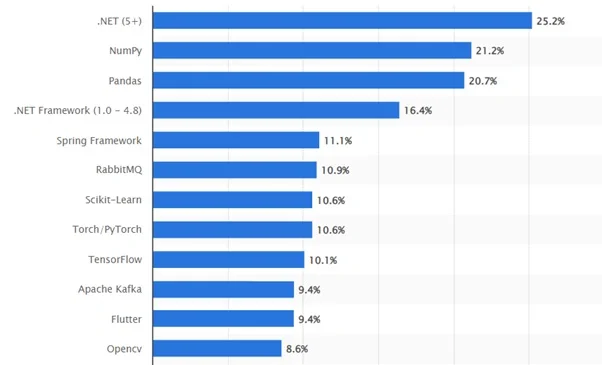The .NET platform and .NET Framework are both popular options for building server-side applications, but they have some key differences. This article provides an overview of each and guidelines on when to choose one over the other for your next project.
Introduction
The .NET platform and .NET Framework share a common lineage but have diverged over time. At a high level:
.NET Framework is the original .NET implementation that shipped with Windows. It includes the CLR (Common Language Runtime) and Base Class Libraries for building Windows desktop and server applications.
.NET is the current open-source and cross-platform evolution of .NET. It can run on Windows, Linux and macOS. .NET includes the CLR, Base Class Libraries and application runtimes for building everything from mobile to web to cloud-native apps.
So, which one should you use for your server application? The choice between .NET Framework or .NET developer outsourcing depends on your goals and constraints around operating systems, hosting models, skills and more. This guide breaks it down.
Key Differences
1. Operating System Support
The .NET Framework only supports Windows operating systems, from Windows 7 onwards. It utilizes Windows native APIs and is deeply integrated into the Windows ecosystem.
Meanwhile, .NET supports Windows, macOS and many Linux distributions like Red Hat Enterprise Linux, SUSE Linux Enterprise Server, and Ubuntu. .NET applications use .NET libraries rather than native OS APIs. This enables running .NET code cross-platform.
Winner: .NET offers more flexibility when deployed on various operating systems, whether on-premises or in the cloud.
2. Hosting Models
The .NET Framework is designed for Windows Server and IIS hosting models. You can self-host .NET Framework apps in a custom process, but IIS is the native way.
.NET apps are optimized for container deployment on Docker and Kubernetes. They can also run standalone on any OS process using included SDKs. Hosting options are vast on .NET, including serverless platforms.
Winner: .NET supports more modern hosting models like containers, serverless and microservices.
3. Skills and Community
The .NET Framework skillset is based on technologies like ASP.NET Web Forms, Windows Communication Foundation (WCF), Windows Workflow (WF), etc. These are Windows-centric frameworks.
The .NET skillset emphasizes ASP.NET Core for the web, Entity Framework Core for data access and cross-platform capabilities. There is huge momentum behind .NET.
Winner: .NET skills transfer better to modern application patterns. The community is also larger and more active.
4. Future Investment
The .NET Framework is in maintenance mode without any new feature development. It will be supported on Windows for many years to come.
.NET is seeing rapid innovation across the whole stack. Microsoft builds its cloud services with .NET and contributes to open-source .NET development.
Winner: .NET has way more investment and resources dedicated to improving it.
5. Access to Latest Features
The .NET Framework is locked to legacy versions of C#, the CLR, and Base Class Libraries. You cannot leverage the latest language and runtime features.
.NET lets you use the newest versions of C#, F#, and other languages, as well as the latest runtime performance improvements and new Base Class Libraries.
Winner: .NET gives you access to cutting-edge features that the .NET Framework won’t.
When to Choose .NET Framework
As of 2024, around 25.2 percent of software developers used .NET (5+) Framework, while around 16.8 percent of respondents used .NET Framework.

Given those differences above, here are the main scenarios to still consider in the .NET Framework:
- You Need Tight Windows Integration – If you rely heavily on Windows APIs, COM interop, workflows, etc., then the .NET Framework integrates better with the Windows platform.
- Migrating Legacy Applications – When migrating older ASP.NET apps that still use Web Forms, WCF services, etc, staying on .NET Framework may be easier in the short-term.
- Running Only on Windows Servers – If deploying exclusively to Windows Server and IIS with no need for Linux or containers, .NET Framework aligns better to this infrastructure.
So, in summary, the .NET Framework remains useful for legacy Windows-based applications and servers.
When to Choose .NET
Here are the top reasons to consider .NET over .NET Framework:
- Cross-Platform Support – You need to support multiple operating systems like Windows, Linux and macOS. This gives you flexibility for on-prem and cloud deployments.
- Microservices and Containers – You want to deploy applications as microservices using Docker containers and orchestrators like Kubernetes.
- High Performance and Scalability – You want the latest runtime and language features for improved performance and scalability.
- DevOps and Automation Friendly – You plan to implement CI/CD pipelines and DevOps practices, which .NET streamlines more than .NET Framework.
- Cloud and Edge Deployments – You’re targeting cloud platforms like Azure, edge computing devices like IoT, or serverless environments.
- Modern Application Patterns – Your architecture follows modern principles like domain-driven design, test-driven development, asynchronous code, etc.
- Future Innovation – You want to build applications on a framework receiving ongoing innovation from Microsoft and the open-source community.
In summary, .NET is best for new applications that use modern architectures, cloud infrastructure, and DevOps practices.
Summary and Recommendations

Here are some bottom-line recommendations when deciding whether to use .NET or stick with .NET Framework:
New Applications
Unless you need tight Windows integration, choose .NET to leverage cross-platform support, cloud hosting models and the latest innovations.
Existing Applications
Consider migrating legacy .NET Framework apps to .NET incrementally over time, especially as you roll out new features.
Windows-Only Servers
.NET Framework remains a viable choice strictly for Windows-based server environments.
Microservices
.NET is the clear choice for building independently deployable microservices.
CI/CD and DevOps
.NET plays better with continuous integration/delivery pipelines and infrastructure automation.
Team Skills
Factor in what knowledge your .NET developers have. Some may need to skill up on .NET while others have already worked with it.
Application Lifetime
If an app will live for 5+ years, starting with .NET will better position it to leverage future innovation. Short-term apps can still feasibly use the .NET Framework.
No technology choice is black and white, so also consider complexity tradeoffs and where you are in your modernization journey. That said, the momentum is clearly behind .NET for greenfield applications. Evaluate whether your new project can feasibly adopt .NET based on the criteria discussed here.
Conclusion
.NET Framework and .NET share common roots but have diverged over the past decade. The .NET Framework maintains niche relevance for legacy Windows Server environments. However, .NET delivers cross-platform capabilities, support for modern app architectures, and access to cutting-edge features.
For most new server applications today, .NET is the best choice. It unlocks cloud hosting options, containerization pathways and the latest runtime advancements. Unless you require deep Windows OS integration, .NET represents the future of application development on the .NET platform. Carefully consider when the .NET Framework still makes sense or where migrating legacy apps to .NET incrementally may work.
With this guide, you now have a firm handle on the .NET vs. .NET Framework decision. Understanding their differences and ideal use cases allows you to choose the best technology for your server application goals and constraints. Both will continue playing a role for years to come, but .NET offers the flexibility and innovation needed by most organizations today.
If you found this article helpful, click here for more.









